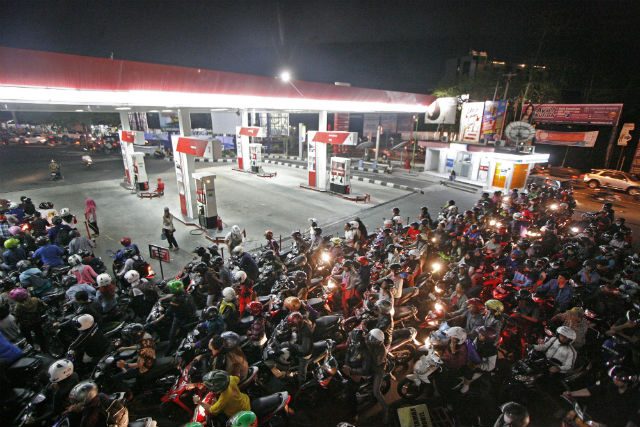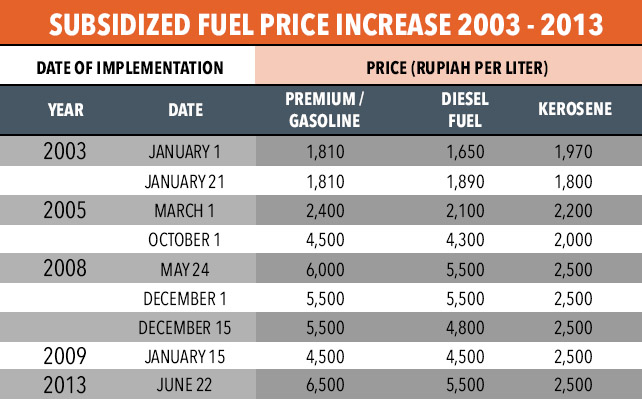SUMMARY
This is AI generated summarization, which may have errors. For context, always refer to the full article.

President Joko “Jokowi”Widodo has said he plans to gradually remove fossil fuel (BBM) subsidies, resulting in incremental price increases for BBM either by November 2014 or after January 2015. As expected, groups like the Public Transport Association are already rejecting this.
Indonesia knows from experience that the BBM subsidy is a political issue. In the late 1990s, protests over fuel price increases contributed to the downfall of President Suharto. In the recent elections, both presidential campaigns were mindful of the issue’s political sensitivities. It has been used as a political commodity by every single leadership campaign.

But I believe that this is exactly what’s wrong with the subsidy debate in Indonesia: It’s focused too much on politics and not enough on economics. I’m not advocating that BBM subsidies be reduced into a mere economics discourse – with mathematics, models, and future projections – but there are 3 simple economics-related concepts of the debate we all need to know to understand why subsidies must be reduced.
1. Subsidies tend to lead to wastefulness
Imagine buying two bars of chocolate because of a “buy 1, get 1” promotion. You’ll probably satisfy your chocolate cravings with one bar, but since you have another bar left, you will likely end up finishing it as well. This leads to a waste in the chocolate market. However, if the chocolate bar was priced correctly, you will probably buy only what you can eat – which was just one bar.
The same principle applies to fossil fuels – which, unlike chocolate, are a limited resource that countries go to war for.
Look at Saudi Arabia and Venezuela, for example. Both have among the lowest gas prices and the highest fuel consumption in the world, even though they’re not particularly populous countries. In Saudi Arabia, fuel consumption increased by 9 times since 1971 and it is now the 6th largest oil consumer in the world. In Venezuela, gasoline consumption per capita is 40% higher than in any other country in Latin America.
Many argue that fuel subsidies are meant to help the poor. But do they really?
2. Most of the people who benefit from the subsidy are not the ones who need it the most
Take a standard city car, for example, that consumes 1 liter of gasoline for every 21.1 kilometers, and compare it to a motorbike that consumes 1 liter for every 41 km. This means a normal car will consume twice as much gasoline as a motorbike.
Sheer observation tells us that more members of the middle-lower class use motorbikes while those from the middle-upper class use cars. If you take into account the time traveled, thanks to traffic jams that stall cars but which motorbikes weave through faster, cars can end up consuming 3 to 4 times more fuel than motorbikes.
What does this tell us? The better off end up using a larger portion of the BBM subsidy than the poor.
3. The subsidy hampers the shift to alternative or renewable sources of energy
Everyone agrees in principle that we have to shift away from fossil fuels to alternative energy, but that shift is made difficult by high barriers to entry, such as intensive capital and technological requirements. Investing in alternative energy can easily involve spending $40 billion over the course of 30 years without any returns in the first decade. It’s already difficult to promote a shift to renewable energy in countries where fuel is priced properly, what more where fuel subsidies exist?
Making things more difficult on the political side of the story, big fossil fuel companies will certainly employ every power at their disposal to prevent such a dangerous competitor (i.e. alternative energy) from entering the market or competing on a level playing field. Alternatively, energy companies will make sure they have sold all their fossil fuel oils before shifting to alternative energy. That does not offer any viable alternative in the mean time.
When BBM subsidies are driven by largely political issues, we tend to overlook the core issues – economics, moral hazards, and inefficiency. But because of the politicization of the issue, Indonesia squandered about one-fifth of its annual budget for BBM subsidies for a decade from 2001 to 2010.
We must start shifting the policy debate from emotion to reason, for a better policy outcome, especially for the poor. – Rappler.com
 Harjo Winoto is an Indonesian legal scholar/philosopher, economist, and social critic. In terms of career, he is the director of Consilium, Public Policy Advocates. He specializes in law & economics, and devotes his thoughts to public issues such as inequality, youth development, and legal pedagogy. Follow him on Twitter at @HarjoWinoto.
Harjo Winoto is an Indonesian legal scholar/philosopher, economist, and social critic. In terms of career, he is the director of Consilium, Public Policy Advocates. He specializes in law & economics, and devotes his thoughts to public issues such as inequality, youth development, and legal pedagogy. Follow him on Twitter at @HarjoWinoto.
Add a comment
How does this make you feel?





There are no comments yet. Add your comment to start the conversation.